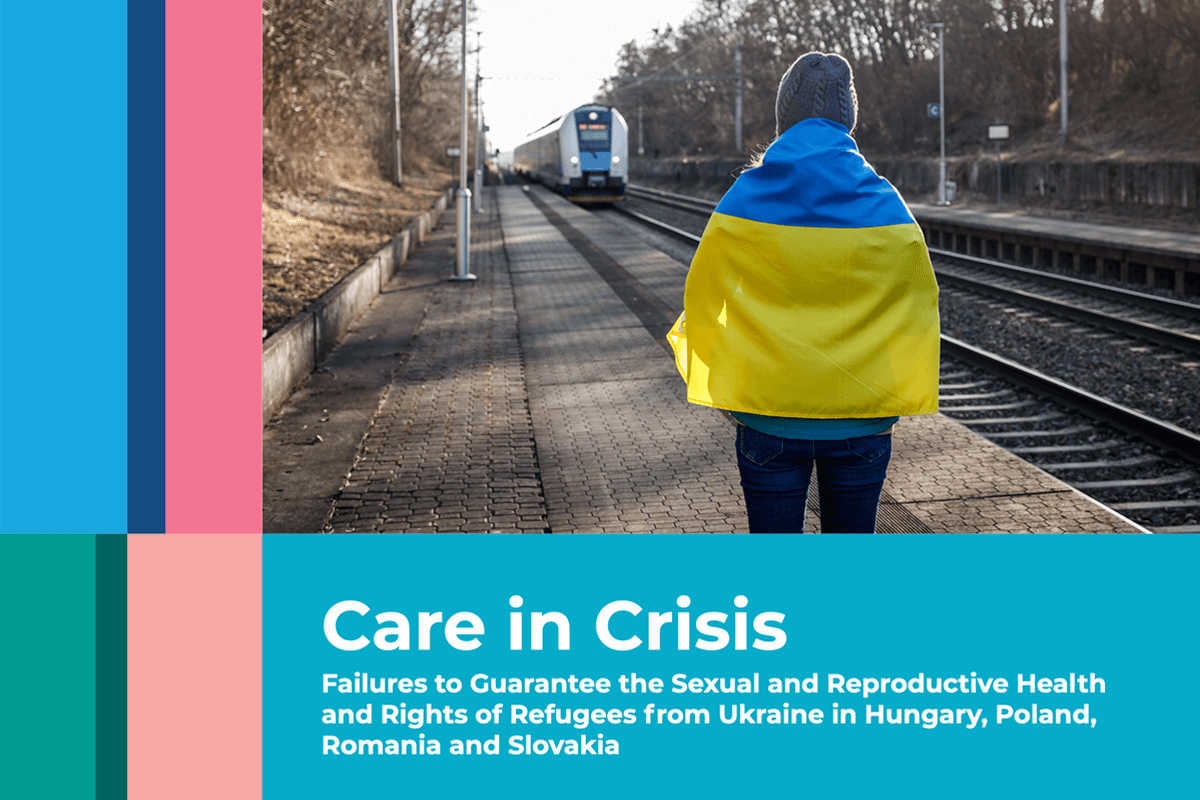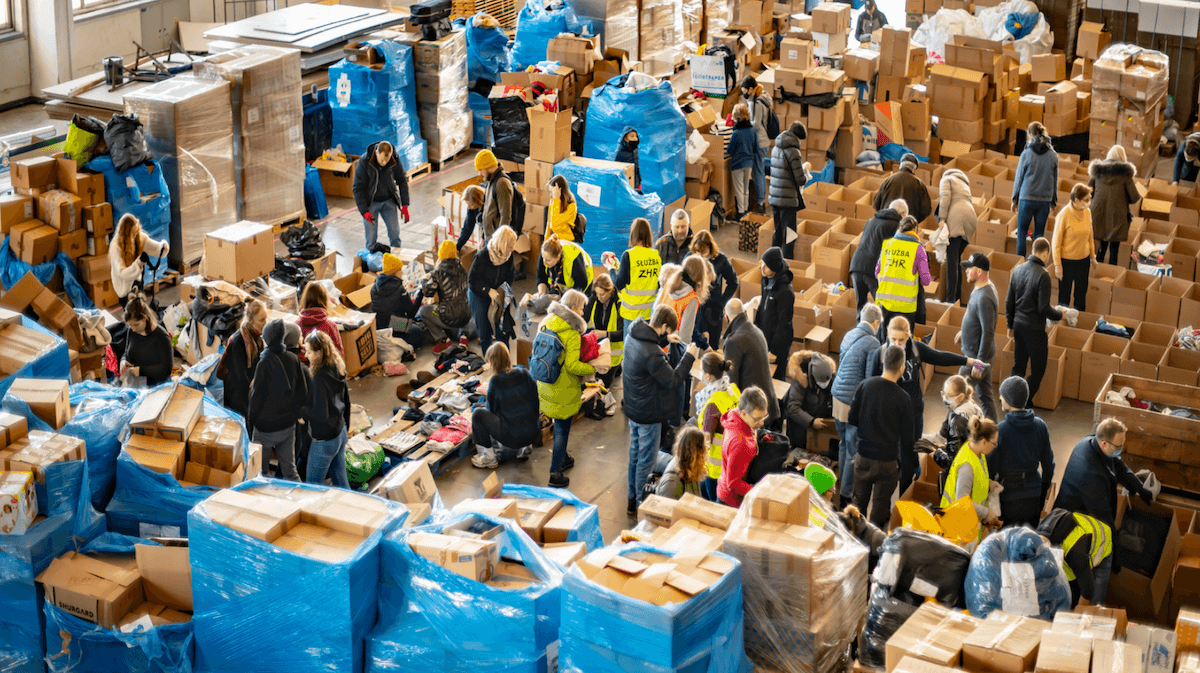
The Center for Reproductive Rights and eight partner organisations — A.L.E.G (Romania), EMMA Association (Hungary), E-Romnja (Romania), Foundation for Women and Family Planning (FEDERA, Poland), Feminoteka Foundation (Poland), Freedom of Choice (Slovakia), FILIA Center (Romania), and Independent Midwives Association (Romania) – have documented the gaps and barriers in access to sexual and reproductive healthcare and gender-based violence support services that are faced by refugees from Ukraine in Hungary, Poland, Romania and Slovakia in this new in-depth, multi-country fact-finding report, published by the Centre for Reproductive Rights.
Executive Summary
The full-scale invasion of Ukraine by the Russian Federation in February 2022 continues to have devastating consequences for the people of Ukraine. Extensive atrocities, attacks on civilians and civilian infrastructure and human rights violations are being perpetrated, including gender-based crimes and conflict-related sexual violence.
Since the invasion began, millions of people from Ukraine have crossed borders into the European Union (EU). Seeking sanctuary, safety and security, many arrive first in Hungary, Poland, Romania and Slovakia. Most are women and children.
From the start of the crisis, local populations, civil society and volunteers in Hungary, Poland, Romania and Slovakia responded with unprecedented solidarity. Societies mobilised on an extraordinary scale and, although imperfect, significant efforts have been made to respond to both the immediate and long-term needs and circumstances of refugees from Ukraine.
At the same time, however, Hungary, Poland, Romania and Slovakia are some of the most challenging contexts in Europe when it comes to sexual and reproductive healthcare and gender-based violence support services. Decades long failures by national governments to invest in and prioritise these forms of care and support, combined with restrictive and unclear legal and policy frameworks, and ongoing stigma and rollbacks on sexual and reproductive rights, heavily constrain access to good quality of care.
As millions of women and girls from Ukraine arrived in Hungary, Poland, Romania and Slovakia, serious concerns arose regarding their ability to obtain essential forms of healthcare, services and support. It became clear that violations of fundamental rights within Ukraine were being compounded by rights violations outside of their country. There was particular concern for refugees who had suffered conflict-related sexual and gender-based violence in Ukraine, including rape and other gender-based crimes. Between July 2022 and April 2023, the nine organisations undertook in-depth, multi-country fact-finding research to examine the gaps and barriers in access to sexual and reproductive healthcare and gender-based violence support services that are faced by refugees from Ukraine in Hungary, Poland, Romania and Slovakia. Over nine months, they collected information from semi-structured interviews with over 80 experts, professional stakeholders and refugees from Ukraine based across these four countries….
The report includes in-depth recommendations to the European Union, humanitarian actors and donors, and the governments of Hungary, Poland, Romania and Slovakia.
Ukrainian refugees are temporarily returning home to receive sexual and reproductive healthcare after finding their options limited in Hungary, Poland, Romania, and Slovakia, while others seek illegal solutions, according to the study.

A study published on Tuesday, the work of nine international human rights organisations documents the alarming impact that restrictive national laws have on refugees seeking essential care and support. It documents the alarming impact that restrictive national laws have on refugees seeking essential care and support. The report’s findings are derived from over 80 semi-structured interviews conducted between July 2022 and April 2023. It found that Ukrainian refugees face detrimental delays, anxiety, fear, financial hardships, institutional racism, and inadequate care, all directly affecting their health and overall well-being.
“The health and well-being of some refugees from Ukraine are at risk because of failures to guarantee access to essential and time-sensitive healthcare and support services, compounding the harm they have endured as a result of the invasion of Ukraine,” the Centre Reproductive Rights’ Senior Regional Director for Europe, Leah Hoctor, told EURACTIV.
“The European Union has promised to provide refugees from Ukraine with sanctuary and care. Yet Ukrainian refugees are temporarily returning home to receive sexual and reproductive healthcare after finding their options limited in Hungary, Poland, Romania, and Slovakia, while others seek illegal solutions. The study found that Ukrainian refugees face detrimental delays, anxiety, fear, financial hardships, and institutional racism. The fact that Ukrainian refugees in Poland are forced to return to Ukraine for abortion care, or to access care in other parts of Europe, is an indictment of Polish law and practice, said Krystyna Kacpura of the Polish Foundation for Women and Family Planning.
Most refugees in Poland seek abortion care outside of legal pathways by buying abortion medication online or travelling to other EU member states to access care. Some women postpone seeking sexual and reproductive healthcare for as long as possible.
But it is not just those seeking reproductive health-related assistance that face obstacles. The report shows that survivors of gender-based violence often go without essential services and support and are dealing with trauma, health concerns and other consequences on their own, while Roma and LGBTQ+ refugees face intersectional discrimination and increased barriers.
ILGA-Europe estimates Poland to be a country where the living conditions for LGBTQ+ are the worst in the European Union, and that several local governments adopted resolutions on ‘LGBT-ideology-free zones’.
Support services for survivors of sexual and gender-based violence in Poland are entirely inadequate, believes Joanna Piotrowska of Feminoteka Foundation, a Polish organisation participating in the study, adding that “many survivors find no safe haven where they can be supported in addressing the traumatic experiences they have endured.”
In Slovakia, Adriana Mesochoritisova from Freedom of Choice said there are not the necessary services in place to help Ukrainian women. In Hungary, it is the same story. And in Romania, gender stereotypes and multiple forms of discrimination are causing problems for refugees, especially when combined with a growing momentum against reproductive freedom.
SOURCES: Care in Crisis, full report 93 pages ; Euractiv, by Aleksandra Krzysztoszek, 17 May 2023



